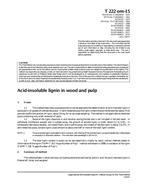Cart 0 Product Products (empty)
No products
To be determined Shipping
$0.00 Total
Product successfully added to your shopping cart
Quantity
Total
There are 0 items in your cart. There is 1 item in your cart.
Total products
Total shipping To be determined
Total
New Reduced price!  View larger
View larger
 View larger
View larger TAPPI T 222 om-15
M00003855
New product
TAPPI T 222 om-15 Acid-Insoluble Lignin in Wood and Pulp
standard by Technical Association of the Pulp and Paper Industry, 2015
In stock
More info
Full Description
TAPPI T 222 om-11 describes a procedure which can be applied to the determination of acid-insoluble lignin in wood and in all grades of unbleached pulps. In semi-bleached pulp the lignin content should not be less than about 1% to provide a sufficient amount of lignin, about 20 mg, for an accurate weighing. The method is not applicable to bleached pulps containing only small amounts of lignin.Some of the lignin dissolves in acid solution during the test and is not included in the test result. In softwoods (coniferous woods) and in sulfate pulps, the amount of soluble lignin is small, about 0.2 to 0.5%. In hardwoods (deciduous woods), non-wood fibers, and in sulfite pulps, the content of soluble lignin is about 3 to 5%. In semi-bleached pulps, soluble lignin could amount to about one-half or more of the total lignin content.
NOTE 1: The acid-soluble lignin can be determined in a solution, after filtering off the insoluble lignin, by a spectrophotometric method based on absorption of ultraviolet radiation. The most often used wavelength is 205 nm (1).
The total lignin content in pulps can be estimated fairly closely by rapid, indirect methods based on chlorination of the lignin (TAPPI T 253 Hypo Number of Pulp - method withdrawn in 1998) or oxidation of the lignin (TAPPI T 236 Kappa Number of Pulp).

